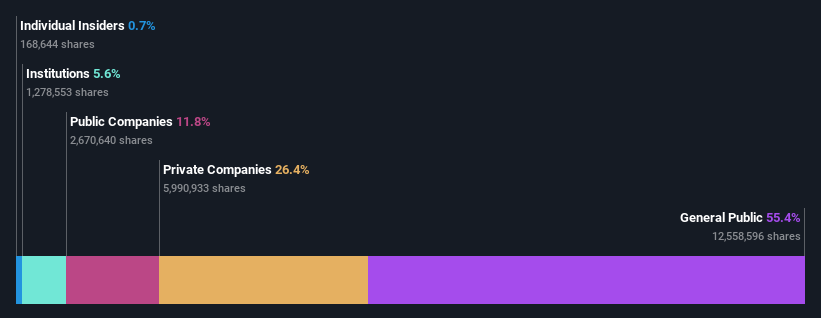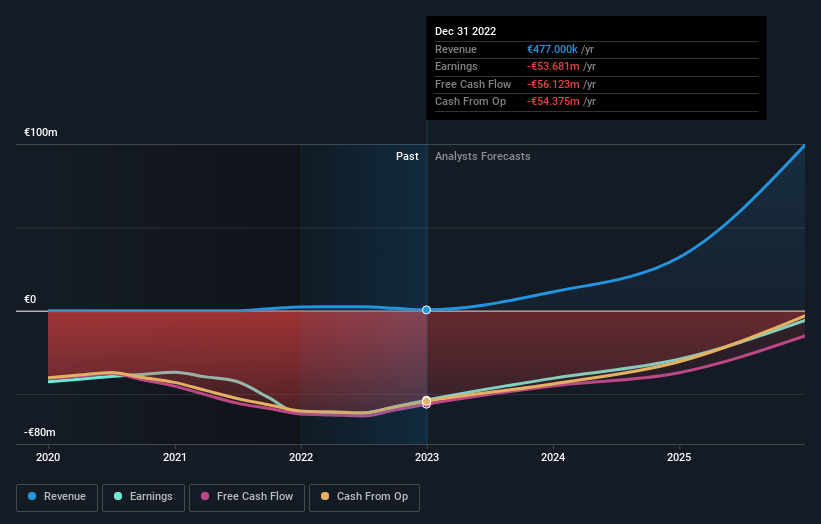- France
- /
- Medical Equipment
- /
- ENXTPA:ALCAR
Individual investors among Carmat SA's (EPA:ALCAR) largest shareholders, saw gain in holdings value after stock jumped 12% last week
Key Insights
- Significant control over Carmat by individual investors implies that the general public has more power to influence management and governance-related decisions
- A total of 21 investors have a majority stake in the company with 45% ownership
- Using data from analyst forecasts alongside ownership research, one can better assess the future performance of a company
A look at the shareholders of Carmat SA (EPA:ALCAR) can tell us which group is most powerful. The group holding the most number of shares in the company, around 55% to be precise, is individual investors. Put another way, the group faces the maximum upside potential (or downside risk).
Clearly, individual investors benefitted the most after the company's market cap rose by €19m last week.
In the chart below, we zoom in on the different ownership groups of Carmat.
Check out our latest analysis for Carmat

What Does The Institutional Ownership Tell Us About Carmat?
Many institutions measure their performance against an index that approximates the local market. So they usually pay more attention to companies that are included in major indices.
We can see that Carmat does have institutional investors; and they hold a good portion of the company's stock. This suggests some credibility amongst professional investors. But we can't rely on that fact alone since institutions make bad investments sometimes, just like everyone does. If multiple institutions change their view on a stock at the same time, you could see the share price drop fast. It's therefore worth looking at Carmat's earnings history below. Of course, the future is what really matters.

Hedge funds don't have many shares in Carmat. Airbus SE is currently the largest shareholder, with 12% of shares outstanding. Lohas S.à R.L. is the second largest shareholder owning 8.4% of common stock, and Sante Holdings S.R.L. holds about 8.0% of the company stock.
On studying our ownership data, we found that 21 of the top shareholders collectively own less than 50% of the share register, implying that no single individual has a majority interest.
While studying institutional ownership for a company can add value to your research, it is also a good practice to research analyst recommendations to get a deeper understand of a stock's expected performance. Quite a few analysts cover the stock, so you could look into forecast growth quite easily.
Insider Ownership Of Carmat
The definition of company insiders can be subjective and does vary between jurisdictions. Our data reflects individual insiders, capturing board members at the very least. Company management run the business, but the CEO will answer to the board, even if he or she is a member of it.
I generally consider insider ownership to be a good thing. However, on some occasions it makes it more difficult for other shareholders to hold the board accountable for decisions.
Our information suggests that Carmat SA insiders own under 1% of the company. But they may have an indirect interest through a corporate structure that we haven't picked up on. It seems the board members have no more than €1.3m worth of shares in the €180m company. Many tend to prefer to see a board with bigger shareholdings. A good next step might be to take a look at this free summary of insider buying and selling.
General Public Ownership
The general public, who are usually individual investors, hold a substantial 55% stake in Carmat, suggesting it is a fairly popular stock. With this amount of ownership, retail investors can collectively play a role in decisions that affect shareholder returns, such as dividend policies and the appointment of directors. They can also exercise the power to vote on acquisitions or mergers that may not improve profitability.
Private Company Ownership
Our data indicates that Private Companies hold 26%, of the company's shares. It's hard to draw any conclusions from this fact alone, so its worth looking into who owns those private companies. Sometimes insiders or other related parties have an interest in shares in a public company through a separate private company.
Public Company Ownership
We can see that public companies hold 12% of the Carmat shares on issue. It's hard to say for sure but this suggests they have entwined business interests. This might be a strategic stake, so it's worth watching this space for changes in ownership.
Next Steps:
While it is well worth considering the different groups that own a company, there are other factors that are even more important. Case in point: We've spotted 4 warning signs for Carmat you should be aware of, and 1 of them is a bit unpleasant.
If you would prefer discover what analysts are predicting in terms of future growth, do not miss this free report on analyst forecasts.
NB: Figures in this article are calculated using data from the last twelve months, which refer to the 12-month period ending on the last date of the month the financial statement is dated. This may not be consistent with full year annual report figures.
New: AI Stock Screener & Alerts
Our new AI Stock Screener scans the market every day to uncover opportunities.
• Dividend Powerhouses (3%+ Yield)
• Undervalued Small Caps with Insider Buying
• High growth Tech and AI Companies
Or build your own from over 50 metrics.
Have feedback on this article? Concerned about the content? Get in touch with us directly. Alternatively, email editorial-team (at) simplywallst.com.
This article by Simply Wall St is general in nature. We provide commentary based on historical data and analyst forecasts only using an unbiased methodology and our articles are not intended to be financial advice. It does not constitute a recommendation to buy or sell any stock, and does not take account of your objectives, or your financial situation. We aim to bring you long-term focused analysis driven by fundamental data. Note that our analysis may not factor in the latest price-sensitive company announcements or qualitative material. Simply Wall St has no position in any stocks mentioned.
About ENXTPA:ALCAR
Carmat
Designs and develops total artificial heart for people suffering from end-stage biventricular heart failure in France and internationally.
Moderate risk and slightly overvalued.
Market Insights
Community Narratives



